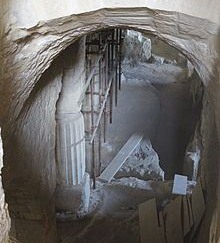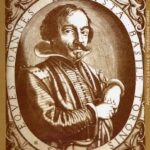ROMOLO AUGUSTO, ULTIMO IMPERATORE – ROMOLO AUGUSTO, LAST EMPEROR

L’ultimo imperatore romano, Romolo Augusto, fu deposto dal “barbaro” Odoacre, che lo tenne relegato nella villa di Lucullo, sull’isolotto di Megaride nel golfo di Napoli. Romolo aveva solo 15 anni. Odoacre gli pagò una ricca pensione per il resto della vita.
Il sacco di Roma del 390 ad opera dei Galli, del 410 condotto dai Visigoti e quello del 455 effettuato dai vandali guidati da Genserico, che arrivarono fino a Roma risalendo il Tevere con la loro flotta, furono i precursori della caduta dell’Impero Romano d’Occidente che avvenne per mano di Odoacre.
I Vandali, il cui re era Genserico, provenivano da Cartagine, la loro patria. Essi avevano stipulato un trattato di pace con i romani. In seguito all’assassinio dell’imperatore Valentiniano III da parte di Petronio Massimoche ne usurpò il trono, Genserico ritenne decaduto il trattato di pace. Tutti i patrizi di Roma, con in testa Petronio Massimo, fuggirono dalla città all’arrivo alle foci del Tevere della flotta dei vandali. Petronio fu catturato poco fuori le mura dalla popolazione abbandonata a se stessa e fu trucidato. Dopo due giorni i vandali entrarono in Roma. Il papa Leone I affrontò Genserico implorando di risparmiare Roma e i suoi abitanti. Nonostante la bruttissima fama che i vandali si portavano dietro, Genserico rispettò il desiderio del papa e l’Urbe e i romani furono in gran parte risparmiati dal ferro e dal fuoco degli invasori, i quali si accontentarono dell’oro e dell’argento che riuscirono a razziare.
La decadenza dell’impero costruito da Roma aveva avuto il suo inizio già nel III secolo, quando i romani cominciarono a utilizzare massicciamente nel loro esercito elementi barbari di stirpe germanica, ottimi combattenti, ma difficili da controllare. La situazione era anche peggiorata da quando i romani rinunciarono al comando delle loro legioni, affidandole a generali anch’essi di origine barbara e germanica. Il controllo dell’esercito era assicurato fin quando i pagamenti del soldo alle truppe e ai loro generali fossero stati puntuali e abbondanti. Quando gli stessi tardavano ad arrivare, le truppe si ribellavano e creavano problemi per il loro controllo.
Dopo Valentiniano III e Petronio Massimo si ebbero altri sei imperatori, da Avito a Glicerio, che non lasciarono traccia di sé nella storia romana. Alla fine del V secolo l’Impero Romano d’Occidente aveva perso molti dei suoi territori. Esso comprendeva l’Italia, la Gallia (Regno di Soissons), la Dalmazia e la Rezia-Norica, odierne Friuli e Austria. Glicerio fu deposto da Giulio Nepote nel 474 che, per dargli un contentino, lo fece nominare vescovo di Milano. L’imperatore Nepote, dopo circa un anno di regno, fu deposto dal suo generale Flavio Oreste.
Flavio Oreste, che era nato in Pannonia, grazie alle conoscenze della moglie, che era figlia del “comes” Romolo, divenne “magister militum” ed ebbe il comando delle truppe romane in Gallia. Non accontentandosi di questa carica, entrò in Italia con le sue truppe per deporre Giulio Nepote. L’imperatore fuggì a Ravenna inseguito da Oreste. Per salvare la vita si imbarcò per la Dalmazia, lasciando campo libero al suo “magister militum”.
Flavio Oreste, volendo fare le cose in regola, chiese all’imperatore d’Oriente, Zenone, la nomina come gerente, per suo conto, dell’Impero Romano d’Occidente. Non avendo ricevuto risposta, il 31 ottobre del 475 fece nominare il figlio Romolo Augusto, di soli 14 anni, Imperatore Romano d’Occidente dal senato romano. Flavio Oreste non poteva ottenere personalmente la nomina poiché era di origine barbara, mentre il figlio, avendo la madre proveniente da una famiglia patrizia romana, era considerato cittadino di Roma.
Data la giovane età di Romolo era il padre Flavio Oreste ad avere l’effettivo potere e a governare l’impero. Per questo motivo fu chiamato Augustolo (la terminazione in “ulus” in latino significava “piccolo”), che stava a indicare l’età e il fatto che non contava nulla. A cura del padre venne anche coniata una moneta d’oro, un “solido” (dalla quale deriva l’attuale “soldo”), con l’immagine del giovane imperatore.
Il comandante delle legioni romane era Odoacre. Egli aveva un’origine Unna o Scira. Era diventato generale dell’esercito romano, “comes domesticorum”, sotto l’imperatore Glicerio. Era intelligente e moderato, come poteva esserlo un generale di origine germanica. Era stato al servizio di Nepote, ma non aveva esitato a schierarsi con Flavio Oreste per aiutarlo a deporre l’imperatore.
Flavio Oreste, data la generale anarchia diffusa in Italia, incontrava molte difficoltà nel reperire le somme necessarie al pagamento delle truppe barbare che formavano l’esercito romano. Il loro comandante Odoacre chiese che a lui e ai suoi soldati venissero concessi un terzo dei territori italiani in sostituzione della remunerazione in denaro. Flavio Oreste si rifiutò di concedere tanta parte del territorio italiano. Le truppe comandate da Odoacre si ribellarono e nominarono il loro comandante “rex”. Dopo pochi giorni, il 28 agosto del 476 i soldati germanici, comandati da Odoacre, catturarono Flavio Oreste a Piacenza e lo uccisero.
Dopo la soppressione di Flavio, Odoacre costrinse il figlio Romolo Augusto, imperatore in carica, a scrivere una missiva a Zenone, imperatore della parte orientale dell’impero romano, con la quale rinunciava al trono per facilitare la riunione dei due imperi, l’orientale e l’occidentale, sotto la corona di Zenone. Nel suo messaggio suggerì di nominare Odoacre quale rappresentante dell’imperatore in Italia. La rinuncia al trono salvò la vita a Romolo che fu relegato nella antica villa di Lucullo situata sull’isolotto di Megaride, nel golfo di Napoli, dove oggi si trova il Castel dell’Ovo. Probabilmente Odoacre risparmiò il giovane Romolo perché, consapevole di non poter mai acquisirne il titolo, ritenne opportuno conservare una carta di riserva mantenendo in vita il giovane imperatore.
Sembra che Odoacre concesse a Romolo Augusto anche una rendita annua di seimila solidi per le sue necessità materiali. Era una somma ragguardevole, che permetteva una vita oltremodo dispendiosa. Non ci sono molte notizie su Romolo Augusto dopo la sua deposizione. Nel 488 la madre di Romolo scrisse ai discepoli di San Severino per invitarli a una cerimonia durante la quale i resti del santo sarebbero stati trasferiti in una chiesa situata sull’isola di Megaride, all’interno della villa di Lucullo.
Odoacre non riuscì a ottenere da Zenone la tanto agognata nomina a “Patrizio”, che avrebbe ufficializzato il suo predominio sull’Italia. Secondo Zenone, il precedente imperatore Giulio Nepote, spodestato da Flavio Oreste, era l’unico a poter disporre delle nomine relative alla penisola italica. Nonostante ciò Zenone, nelle missive che gli indirizzò in seguito, lo apostrofava “Patrizio”. Giulio Nepote non rientrò mai più in Italia, preferendo soggiornare in Dalmazia.
Zenone, dopo qualche anno, cambiò idea circa il controllo che Odoacre esercitava sull’Italia e sulla Dalmazia, che lo stesso aveva nel frattempo invasa. Intorno all’anno 490 incaricò Teodorico, re degli Ostrogoti, di conquistare l’Italia. Dopo vari scontri, che si conclusero il più delle volte con la vittoria degli Ostrogoti, Odoacre si rifugiò a Ravenna. Teodorico cinse d’assedio la città. La resistenza di Odoacre fu accanita e durò alcuni mesi. Alla fine, non avendo più speranze di vittoria, accettò un accordo con il re ostrogoto che prevedeva un governo congiunto di entrambi sull’Italia. Durante i festeggiamenti che seguirono l’accordo Teodorico sottrasse la spada a Odoacre e lo colpì con un fendente alla clavicola. Odoacre morì poco dopo per la grave ferita.
Si ha notizia di una corrispondenza tra Teodorico e Romolo Augusto nell’anno 507. In essa il segretario di Teodorico, Cassiodoro, confermava la rendita annua in favore dell’ex imperatore, che si spense a Napoli, nella sua villa fortificata, in un anno imprecisato, posteriore al 511.
Romolo Augusto viene considerato da molti studiosi l’ultimo imperatore dell’Impero Romano d’Occidente. L’anno della sua deposizione, il 476, viene considerata come la data di inizio del medioevo. Alcuni storici considerano invece come ultimo imperatore Giulio Nepote poiché fu l’ultimo a essere riconosciuto come tale da Zenone. Pertanto considerano il 480, data della morte di Nepote per mano di Ovidia, l’anno della fine dell’Impero Romano d’Occidente. Comunque l’ultimo imperatore riconosciuto come tale dal Senato Romano, l’unica autorità che aveva il potere formale di eleggere gli stessi, fu Romolo Augusto.
versione inglese
The last Roman Emperor, Romolo Augusto, was removed by the “barbarian” Odoacre, who kept him relegated to the villa of Lucullo, on the island of Megaride in the Gulf of Naples. Romolo was only fifteen years old. Odoacre paid him a rich retirement for the rest of his life.
The sack of Rome of 390 by the Gauls, of 410 by the Visigoths and the sack of 455 by the vandals led by Genserico, who arrived to Rome by climbing the Tiber with their fleet, were the precursors of the fall of the Western Roman Empire took place at the hands of Odoacre.
The Vandals, whose Genserico was king, came from Carthage, their homeland. They had signed a peace treaty with the Romans. Following the assassination of Emperor Valentinian III by Petronio Massimo who usurped the throne, Genserico believed the peace treaty had fallen. All the patricians of Rome, headed by Petronio Massimo, escaped from the city on arrival at the Tiber mouth of the vandeel fleet. Petronio was captured little outside the walls of the city by the abandoned population and was killed. After two days the vandals entered Rome. Pope Leo I faced Genserico by imploring to save Rome and its inhabitants. In spite of the bad reputation which came with the vandals, Genserico respected the pope’s desire and the Urbe and the Romans were largely spared by the fire and the sword of the invaders, who were happy with the gold and silver they managed to raid.
The decadence of the empire built by Rome had its beginning already in the third century, when the Romans began to engage massively in their army barbaric elements of Germanic origin, good fighters but difficult to control. The situation had also deteriorated since the Romans renounced the command of their legions, entrusting them to generals of barbarian and Germanic origins. Army control was ensured until the money payments to troops and their generals were punctual and abundant. When the money were late to arrive, the troops rebelled and created problems for their control.
After Valentinian III and Petronio Massimo there were another six emperors, from Avito to Glicerio, who did not leave their traces in Roman history. At the end of the fifth century, the Western Roman Empire had lost many of its territories. It included Italy, Gaul (Kingdom of Soissons), Dalmatia and Rezia-Norica, today Friuli and Austria. Glicerio was deposed by Giulio Nepote in 474, which, to give him a consolation prize, made him the bishop of Milan. After about a year of reign, Emperor Nepote was removed by his general, Flavio Oreste.
Flavio Oreste, who was born in Pannonia, thanks to the knowledge of his wife, who was the daughter of “Comes” Romulus, became “magister militum” and commanded the Roman troops in Gaul. Not content with this task, he entered Italy with his troops to remove Giulio Nepote. The emperor fled to Ravenna, pursued by Oreste. He embarked for Dalmatia, leaving coast clear to his “magister militum”, saving his life.
Flavio Oreste, wanting to do things right, asked the Eastern Roman Emperor, Zenone, to appoint him as his representative in the Western Roman Empire. Not having received a reply, on October 31, 475, he made Roman Senate do his son Romolo Augusto, just 14 years old, the Western Roman Emperor. Flavio Oreste could not personally obtain the nomination because he was of barbarian origin, while his son, his mother being from a Roman patrician family, was considered a citizen of Rome.
Because of the young age of Romolo, his father Flavio Oreste had the power and he ruled the empire. For this reason he was called Augustolo (the term “ulus” in Latin meant “small”), which was indicative of age and the fact that he did not count for anything. His father did also coined a golden coin, a “solido” (from which derived the current “soldo”), with the image of the young emperor.
The commander of the Roman legions was Odoacre. He had an Unna or Scira origin. He became general of the Roman army, “comes domesticorum,” under the Emperor Glicerio. He was smart and moderate, as a general of Germanic origin could be. He had been serving Nepote but had not hesitated to side with Flavio Oreste to help him to remove the emperor.
Flavio Oreste encountered many difficulties in finding the sums needed to pay the barbarian troops that formed the Roman army, given the general anarchy widespread in Italy. Their commander Odoacre asked that he and his soldiers be granted one-third of the Italian territories in exchange for money remuneration. Flavio Oreste refused to grant much of the Italian territory. The troops commanded by Odoacre rebelled and appointed their commander “Rex (King)”. After a few days on August 28, 476 German soldiers, commanded by Odoacre, captured Flavio Oreste in Piacenza and killed him.
After the killing of Flavio, Odoacre forced his son Romolo Augusto, reigning emperor, to write a letter to Zenone, emperor of the eastern part of the Roman Empire, with whom he renounced the throne to facilitate the reunion of the two empires, the eastern Empire and the western, under the crown of Zenone. He suggested appointing Odoacre as representative of the emperor in Italy in his message. The resignation to the throne saved life to Romolo who was relegated to the ancient villa of Lucullo located on the islet of Megaride, in the Gulf of Naples, where today the Castel dell’Ovo is sited. Probably Odoacre spared the young Romolo because, aware that he could never acquire the title, thought it appropriate to keep a backup possibility while keeping the young emperor alive.
It seems that Odoacre also granted Romolo Augusto an annuity of six thousand solids for his material needs. It was a remarkable sum, which allowed a very expensive life. There is not much news about Romolo Augusto after his removal. In 488, mother of Romolo wrote to the disciples of San Severino to invite them to a ceremony during which the remains of the saint would be transferred to a church on the island of Megaride, inside Lucullo’s villa.
Odoacre could not get long-wanted appointment to “Patrician” by Zenone who would have officially declared his dominance over Italy. According to Zenone, the former Emperor Giulio Nepote, who was removed by Flavio Oreste, was the only one to have nominations relating to the Italian peninsula. Despite this, Zenone apostrophed him as “Patrician” in the messages that later addressed him. Giulio Nepote never returned to Italy, preferring to stay in Dalmatia.
After a few years Zenone changed his mind about the control Odoacre exercised over Italy and Dalmatia that he had in the meantime invaded. Around the year 490, he charged Theodoric, king of the Ostrogoths, to conquer Italy. After several clashes, which ended most often with the Ostrogoth’s victory, Odoacre took refuge in Ravenna. Teodorico besieged the city. Odoacre’s resistance was fierce and lasted for a few months. In the end, having no hope of winning, he agreed with the king of Ostrogoth, which provided for a joint government of both of them on Italy. During the celebration following the agreement, Theodoric took the sword from Odoacre and struck him with a slice to the collarbone. Odoacre died shortly after the serious injury.
There is a correspondence between Theodoric and Romolo Augusto in 507. The secretary of Teodorico, Cassiodoro, confirmed the annual annuity in favor of the former emperor who died in Naples, in his fortified villa, in one unspecified year back to 511.
Romulus Augustus is considered by many historians as the last emperor of the Western Roman Empire. The year of his removal, 476, is considered to be the beginning date of the Middle Ages. Some historians consider Giulio Nepote as the last emperor, as he was the last to be recognized as such by Zenone. They therefore consider 480, the date of Nepote’s death by Ovidia, the year of the end of the Western Roman Empire. However, the last emperor recognized as such by the Roman Senate, the only authority with the formal power to elect them, was Romolo Augusto.
Bibliography:
Michael Grant, Gli imperatori romani, Roma, Newton & Compton, 2005
Arnaldo Momigliano, La caduta senza rumore di un impero, in Sesto contributo alla storia degli studi classici,Edizioni di Storia e Letteratura, Roma, 1980
it.wikipedia.org/wiki/Romolo Augusto
it.wikipedia.org/wiki/Flavio Oreste
it.wikipedia.org/wiki/Odoacre
fonte
napolihistory.com



 invio in corso...
invio in corso...



